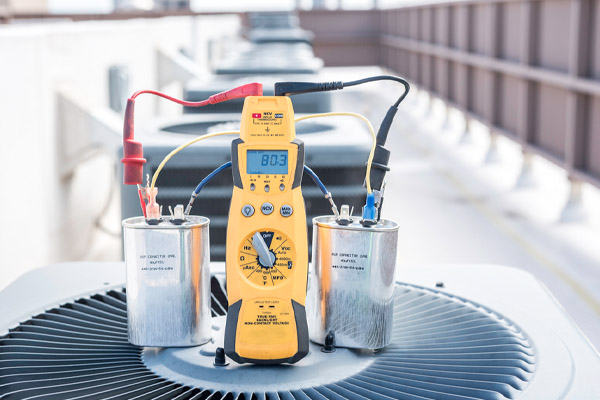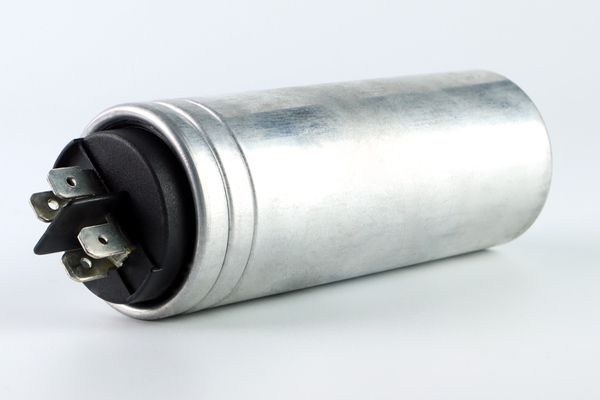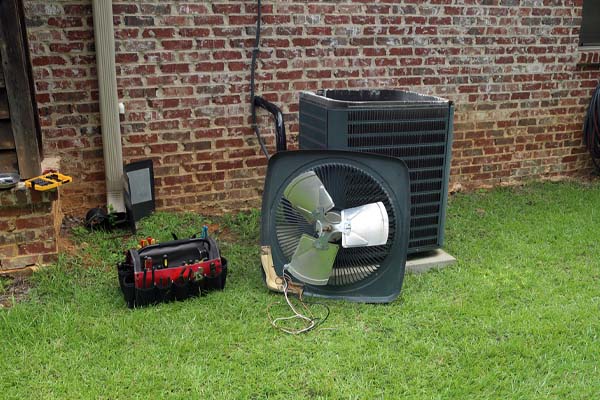Air Conditioner Capacitors: What They Are & Why They Matter

Air conditioner capacitors play a crucial role in the proper functioning of your AC system. Despite the AC capacitors’ small size, these electrical components significantly impact the overall performance of your air conditioning unit. Understanding what capacitors are and their importance is essential for homeowners and HVAC enthusiasts alike.
This article discusses the role, function, and importance of air conditioner capacitors, including the different types, common signs of capacitor issues, and why they matter in maintaining efficient cooling in your home. By gaining knowledge about capacitors, you will be better equipped to identify and address potential capacitor problems, ensuring optimal performance and longevity of your air conditioning system.
The Air Conditioner Capacitors’ Function
Contents
- 1 The Air Conditioner Capacitors’ Function
- 2 Call McAllister Energy For All Of Your HVAC Requirements
An AC capacitor is a cleverly designed device that consists of two metal conductors separated by an insulating material. In the context of an air conditioner, capacitors are often recognizable as large, cylindrical batteries with two or three posts protruding from the top.
The AC capacitor plays a vital role in powering the motors of your air conditioning system, enabling it to cool your home effectively. This small but critical component is often subject to replacement due to its tendency to malfunction or fail.
When the AC capacitor stops working, it can disrupt the entire operation of your HVAC system. As a result, your air conditioner may struggle to circulate cool air, leading to increased strain on the unit and potentially higher energy costs. Understanding the significance of the AC capacitor can help you address any issues promptly, ensuring efficient cooling and preventing unnecessary expenses.
Related Article: Key Differences Between Central & Forced Air Systems
Why Is An Air Conditioner Capacitor Important?

An AC capacitor’s primary function is to store and release electrical energy to power the motors so the AC unit can properly function. When the cooling system is turned on, the capacitor provides a jolt of electricity to start the motors, allowing them to spin and operate the compressor and fan. It is a temporary power source, supplying the necessary energy for the initial air conditioner motor startup.
The AC capacitor is vital because the motors would struggle to start or may not start at all without it. A malfunctioning or faulty capacitor can lead to issues such as the air conditioning unit not turning on, weak HVAC airflow, or the compressor repeatedly cycling on and off. Sometimes, a failed capacitor can cause the entire air conditioning system to stop working. So, ensuring the proper functioning of the capacitor is vital for the overall performance and efficiency of the AC system. Regular HVAC maintenance and timely replacement of capacitors when necessary can help prevent potential breakdowns and maintain optimal cooling performance.
Why AC Capacitors Fail Or Malfunction
Air conditioner capacitors can fail or malfunction due to various reasons. Some common causes include:
- Age and Wear: Over time, capacitors can deteriorate, weaken and lose their ability to hold a charge. Their internal components may degrade as they age, leading to reduced capacitance and eventual failure.
- Overheating: Capacitors are exposed to heat during normal operation, but excessive heat can cause them to overheat and degrade faster. High temperatures can accelerate the breakdown of internal components and insulation, leading to capacitor failure.
- Voltage Fluctuations: Rapid voltage fluctuations or power surges can stress capacitors, causing them to fail. Electrical spikes, lightning strikes, or power outages can disrupt the normal functioning of capacitors and lead to failure.
- Manufacturing Defects: In some cases, capacitors may have manufacturing defects that make them prone to premature failure. These defects can include poor-quality materials, improper assembly, or inadequate testing during the manufacturing process.
- Excessive Electrical Load: If the air conditioning system is subjected to heavy electrical loads, such as running for extended periods or operating in extreme weather conditions, it can strain the capacitors and lead to failure.
- Environmental Factors: Harsh environmental conditions, such as exposure to moisture, humidity, dust, or corrosive chemicals, can affect the performance and lifespan of capacitors. These factors can cause corrosion, insulation breakdown, or short circuits within the capacitor.
Regular air conditioner maintenance, including inspection and testing of capacitors, can help identify potential issues before they lead to complete failure. If a capacitor shows signs of bulging, leaking, or has a burnt smell, it indicates a malfunctioning capacitor that should be replaced promptly to avoid further damage to the AC system.
Related Article: Why Are My Lights Flickering When My AC Turns On?
Signs Of A Bad AC Capacitor

Watch out for the following signs of a bad AC capacitor. It may include:
- Weak or No Cold Air: If your air conditioner blows warm or weak airflow instead of cold air, it could indicate a faulty capacitor. The capacitor plays a crucial role in powering the motors that drive the cooling process, so that a malfunctioning capacitor can result in insufficient cooling.
- Difficulty Starting: A failing capacitor may cause your air conditioner to struggle when starting up. It might take longer than usual for the system to kick in or repeatedly attempts to start but fails to do so.
- Frequent Cycling: A capacitor on the verge of failure may cause your air conditioner to cycle on and off more frequently than usual. This rapid cycling can stress the system and increase wear and tear.
- Buzzing or Humming Sounds: Unusual noises, such as buzzing or humming, coming from your air conditioner could indicate a capacitor problem. Faulty capacitors can cause electrical disturbances that manifest as strange sounds.
- Capacitor Bulging or Leaking: Physical signs of a bad capacitor include bulging or swelling of its cylindrical body. In severe cases, the capacitor may leak oil or show signs of charring or burning. These visual indications suggest a damaged or compromised capacitor that needs immediate replacement.
- Tripped Breaker: A malfunctioning capacitor can cause excessive electrical currents, leading to a tripped circuit breaker. If your air conditioner repeatedly causes the breaker to trip, it is worth inspecting the capacitor as a potential culprit.
Call A Professional HVAC Contractor – Do Not Perform DIY Air Conditioner Capacitor Repair
It is crucial to call a professional HVAC technician if your AC capacitor fails or malfunctions for several reasons:
Safety
Working with electrical components can be dangerous, especially if you lack the necessary knowledge, training, and experience. Capacitors store electrical energy even when the power is disconnected, and mishandling them can lead to electrical shocks or injuries. HVAC professionals are trained in handling these components safely.
Related Article: What is a High-Velocity Mini Duct HVAC System?
Proper Diagnosis
While a faulty capacitor may be one of the possible causes of AC issues, there could also be other underlying problems. HVAC technicians have the expertise to accurately diagnose the problem and determine if the capacitor is the culprit or if other issues contribute to the malfunction.
Correct Air Conditioner Capacitor Replacement

Capacitors come in different sizes, voltage ratings, and capacitance values, and selecting the wrong one can further damage your AC system or lead to improper functioning. HVAC professionals know how to identify the correct capacitor and ensure proper installation, preventing further complications.
Related Article: When to Call Emergency HVAC Services
HVAC Warranty Considerations
If your AC unit is under warranty, attempting to repair or replace components yourself may void the warranty. Professional technicians have the necessary certifications and knowledge to repair without jeopardizing warranty coverage.
Air Conditioner Efficiency & Performance
AC systems are complex, with various components working together to provide optimal cooling performance. A professional technician can assess the overall system, not just the capacitor, to ensure all components function correctly. This helps optimize the system’s efficiency, cooling capacity, and overall performance.
Related Article: 10 Reasons Why Your AC Unit Isn’t Blowing Cool Air
Conclusion
Overall, calling a professional HVAC technician ensures that the repair or replacement of the AC capacitor is done safely, accurately, and in consideration of the entire system. It helps protect your investment, maintain warranty coverage, and ensure your air conditioning system’s efficient and reliable operation.
Related Article: Is Your HVAC System Protected From Power Surges?
Call McAllister Energy For All Of Your HVAC Requirements

McAllister Energy offers superior heating and cooling services throughout southern New Jersey. We hire the best-certified technicians who can provide you with excellent HVAC tune-ups, repairs, installations, and replacements. Each of our techs has the knowledge and experience to service your HVAC system correctly.
McAllister Energy guarantees the most competitive heating and cooling service costs in the area. Our maintenance services can improve your comfort and increase your energy efficiency while reducing your home heating and cooling costs. If you happen to need an HVAC repair or replacement system, we can recommend the best one for your home while staying within your budget. We back all of our work with a guarantee to ensure your satisfaction. To schedule a service appointment, give McAllister Energy a call today. We offer free, in-home estimates.
You can click here to contact us now or call us at (856) 665-4545 to find out more! Click the link to view our service area.